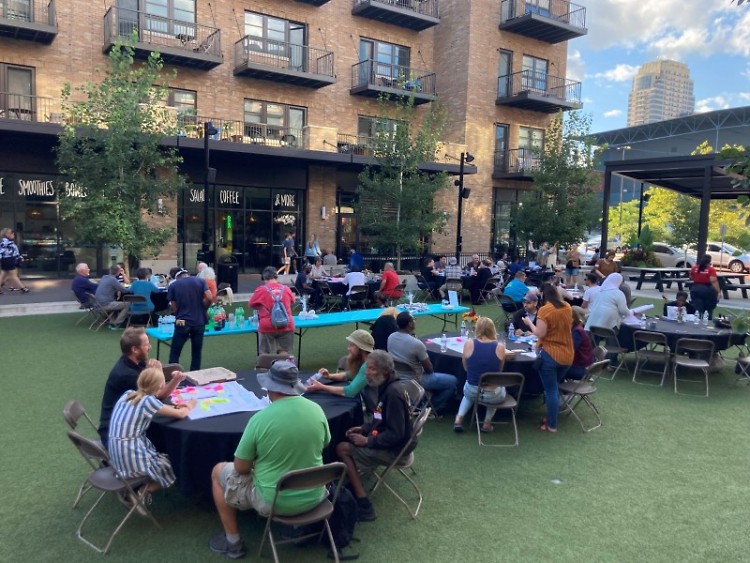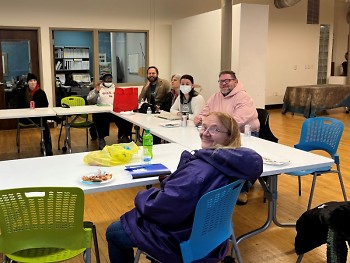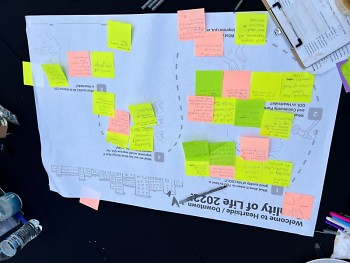“There are many different ways to provide for others, but Quality of Life helps us know what the community actually wants. It helps to empower the people,” says Heartside neighbor Doreen Timmers. Quality of Life is a community-wide assessment of needs in the Heartside and Downtown Neighborhoods, carried on by active leaders in the community.
Years of active participation from Heartside neighbors in the Quality of Life process shows the widespread desire to find concrete solutions to complex issues, from fresh food access to mental healthcare and support for their neighbors who are experiencing homelessness. In 2017-2018, over 200 Heartside residents contributed ideas during the Quality of Life process and presented a set of recommendations to the City of Grand Rapids. The Portland Loo on South Division (on the corner of Division and Weston) updated street lighting, and revisions to Pekich Park are all accomplishments that were born out of a group of citizens’ love for their neighborhood.
In 2021, resident leaders called on community partners to renew interest in Quality of Life issues in Heartside; many of these topics had fallen by the wayside during the pandemic. Currently, those partners include The City of Grand Rapids, Downtown Grand Rapids Incorporated, The Heartside Downtown Neighborhood Association, and Dwelling Place. City of Grand Rapids employees Tyler Kent and Layla Aslani, who are currently working on the Master Planning Process, understand the importance of listening to the vision of residents. “...There [are] unique circumstances in the Heartside neighborhood– it’s not exactly like other neighborhoods in our city,’ remarks Asani. “And Quality of Life is an asset-framed approach, so it avoids focusing on all the problems.” Since the summer, Quality of Life partners and committed resident leaders have engaged nearly 300 people through listening sessions, surveys, and focus groups to determine what they most care about and want to see changed in their neighborhood. Pizza on the Piazza, a listening session hosted at Studio Park in July of 2022, engaged 88 Heartside and Downtown neighbors. At the core of this work is a collective commitment to one another and the built environment where people reside.
Timmers, a Heartside resident who has lived in a Dwelling Place property for many years and participated in both iterations of the Quality of Life process, is interested in keeping momentum up, even when the City has a wide range of priorities tugging at its sleeves. “I want to hold the proper people accountable,” she says, finding a suitable metaphor: “It may be an upstream battle, but it’s a battle that can be fixed to some degree. Trout, when they go to spawn, have to travel upstream. And they make it every year. So what’s stopping us from going upstream for a while? We have to find solutions for this, and they have to be solutions that can be maintained.”
Community organizing efforts that put the power in the hands of everyday citizens are happening across the region. Together West Michigan is a broad band organizing effort that has connected dozens of Grand Rapids organizations and church congregations together. Megan Cottrell and Javier Ronquillo, co-leaders of Together West MI research teams, know all about the long, hard work of going upstream. Megan says, “The most difficult part is that it’s not a linear process. As we move forward, we're discovering new things and we're building new relationships.” Javier adds, “I am interested in getting at the root causes of things. The other thing that is very appealing to me about Together West Michigan, was that power was named explicitly. We are going to build power, and that to me is very important not because I am not someone that necessarily wants power, but I do think that there needs to be some balance.”
“Your voice gets heard,” Timmers concludes. “Your solution may be the answer to the problem, and you might not know it. Offer it. People need to find out they’re not alone; once they find that out, it opens a door.”
With a mission to improve the lives of people by creating quality affordable housing, providing essential support services and serving as a catalyst for neighborhood revitalization, Dwelling Place serves families and people in 4 counties across West Michigan. Dwelling Place is powered by volunteers and numerous staff persons, guest writers create our Rapidian content. Thanks to Kelli Erikson, Hope College Social Work intern for her contribution of this article.
The Rapidian, a program of the 501(c)3 nonprofit Community Media Center, relies on the community’s support to help cover the cost of training reporters and publishing content.
We need your help.
If each of our readers and content creators who values this community platform help support its creation and maintenance, The Rapidian can continue to educate and facilitate a conversation around issues for years to come.
Please support The Rapidian and make a contribution today.
- city of grand rapids
- collective power
- community engagement
- community participation
- dgri
- fresh food access
- grand rapids
- grocery access
- hdna
- heartside
- heartsidestrong
- housing
- listening sessions
- master plan
- master planning
- mental health awareness
- mental healthcare
- participatory budgeting
- pekick park
- public safety
- qol
- quality of life
- workgroup


